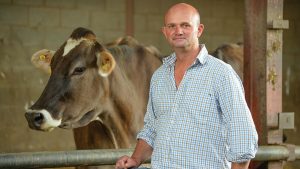
Gwynfor Jarman and his family welcomed FUW president Glyn Roberts, FUW North Wales vice president Eifion Huws, FUW policy officer Elin Jenkins and county staff to Gwernhefin, the family farm which overlooks Llyn Tegid near Bala.
The farm employs one full-time worker, and the members of the family take an active role. Eldest daughter Beca (20) is currently at Durham University, Gweno (18) is at Aberystwyth, Lowri (15) is at Ysgol Godre’r Berwyn at Bala, and Emrys (8) is at Ysgol O M Edwards, Llanuwchllyn.
Mr Jarman spoke of the challenges of transitioning Gwernhefin from a beef and sheep system to a dairy farm, a journey he started 12 years ago, but stressed that bovine TB is an increased concern.
The farm still keeps a flock of 600 mainly Welsh Mountain ewes. The farm also has a small suckler herd, and all young stock are kept on farm and sold either as stores or finished cattle, with some sold as bull beef.
Speaking about the journey into dairy farming he said: “One of the first major obstacles we faced was to obtain grid connection to provide sufficient power to run the 10/20 parlour.
“To start with we were running 100 milkers, but as the new venture developed it soon became apparent that investment into a larger parlour was needed, so following a lengthy planning application period a consent for 36 point rotary parlour and buildings was granted.”
The new parlour, he said, has allowed for better time management, which in turn has made it possible for the family to expand to 200 milkers to date. He also said that he was fortunate to be able to sell their milk to Arla.
Having taken the many ups and downs into his stride over the years, what concerns the family the most is a worsening bovine TB picture.
“You just can’t escape the looming cloud of Bovine TB. Gwenhefin is situated in the Low Risk Area of Wales, but even here we are concerned about the worsening TB picture to the East ,” said Mr Jarman.
“It is all very real and a real worry for us.”
Having recently returned inconclusive test results, the business is having to deal with the implications of movement lockdown and the issues this will cause with housing at calving time in the spring if the breakdown continues.
“The only glimmer of hope I can see is the prospect of a workable TB vaccine to fight this disease. All testing, movement restrictions and biosecurity initiatives that are currently in place are clearly not working to protect our business from breakdown,” added Mr Jarman.
Ms Jenkins said: “It is a grave concern to hear of a TB breakdown in the any area of Wales, but where the intention of Welsh Government’s TB Eradication Programme is to protect and keep out disease, especially in Low Risk Areas such as this, then it is obvious that the Eradication Programme is not delivering on its objectives.”























